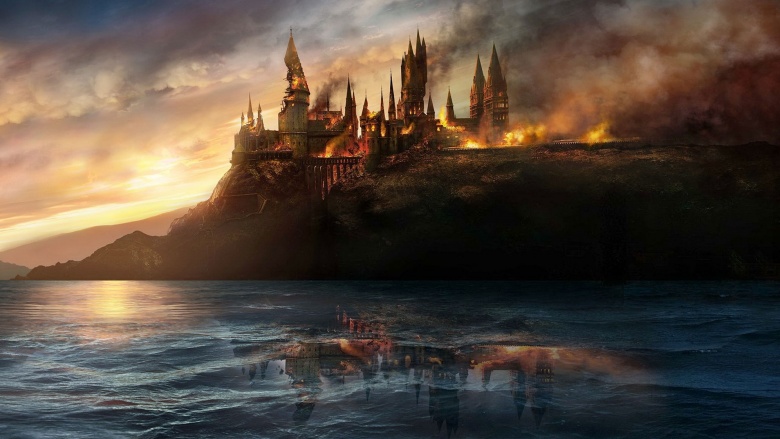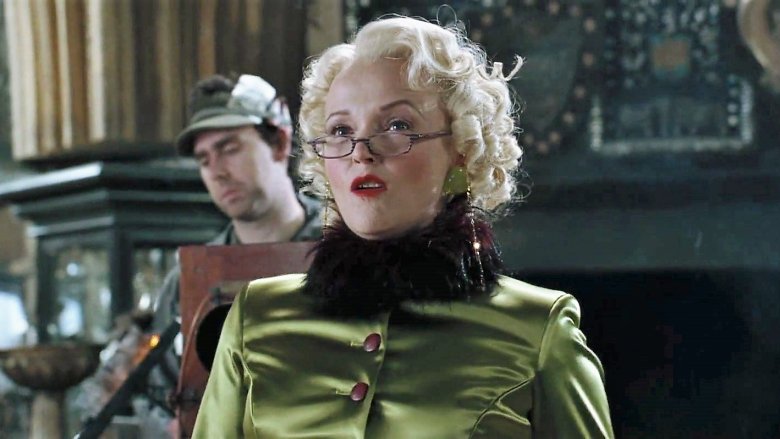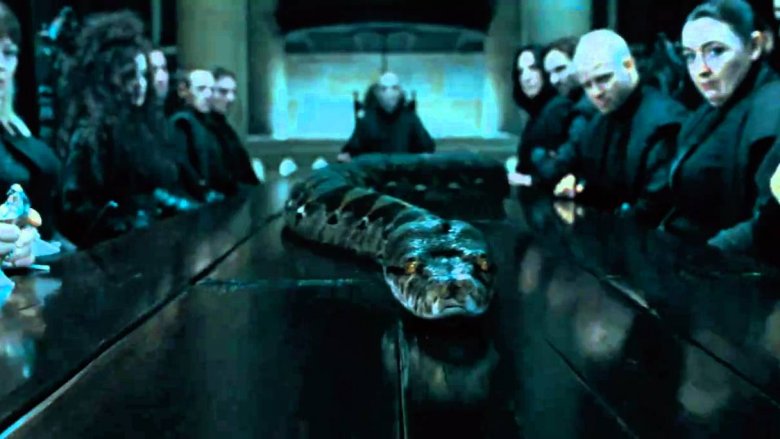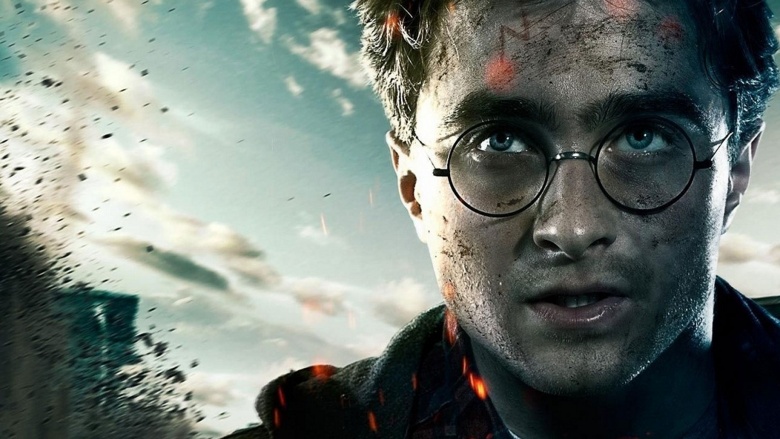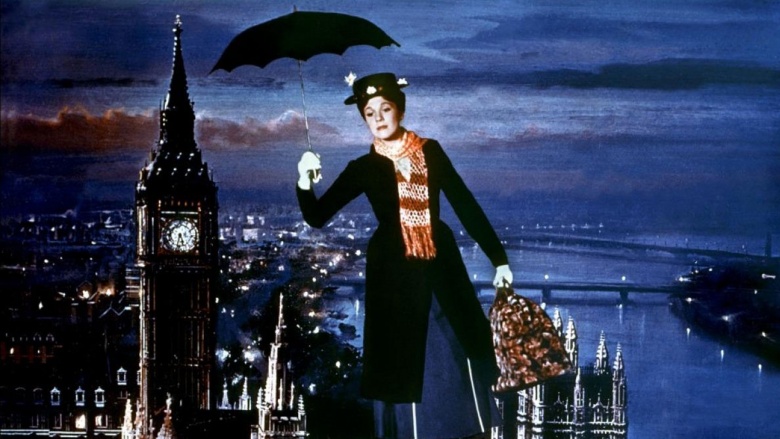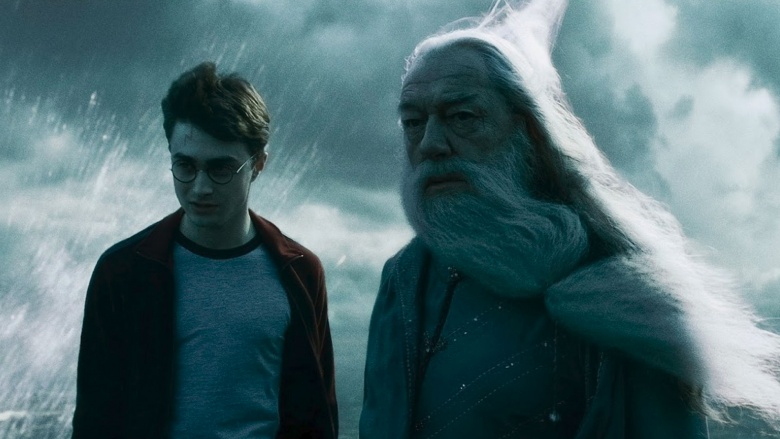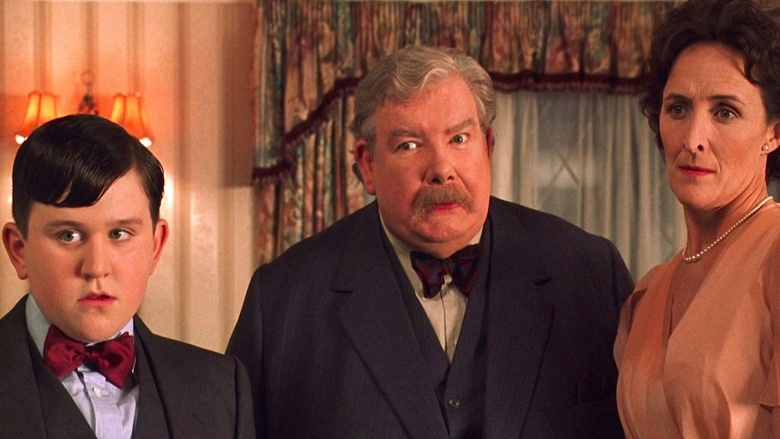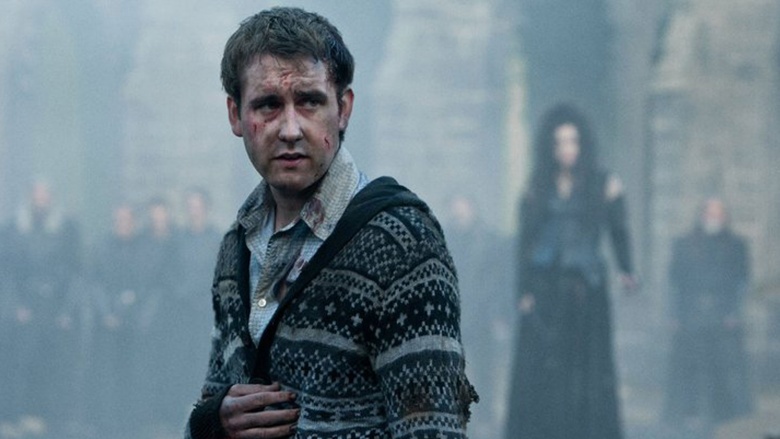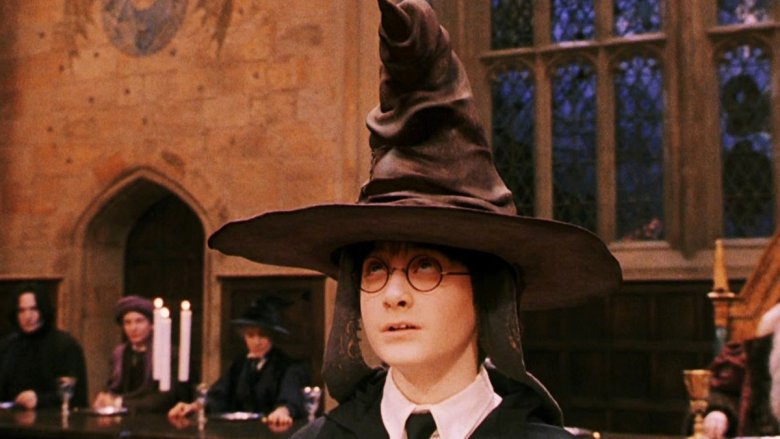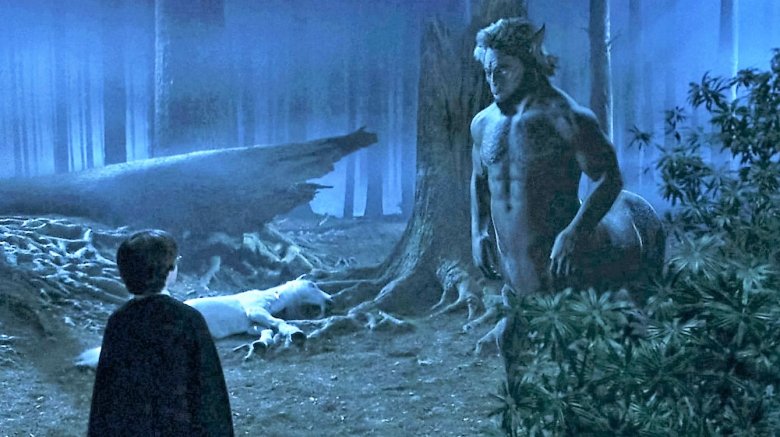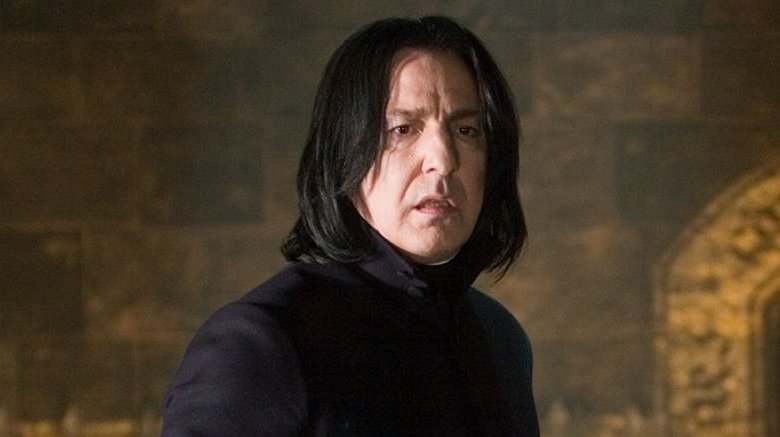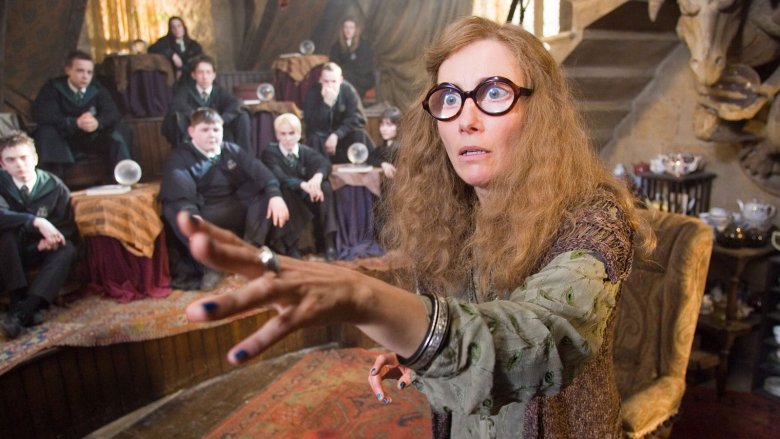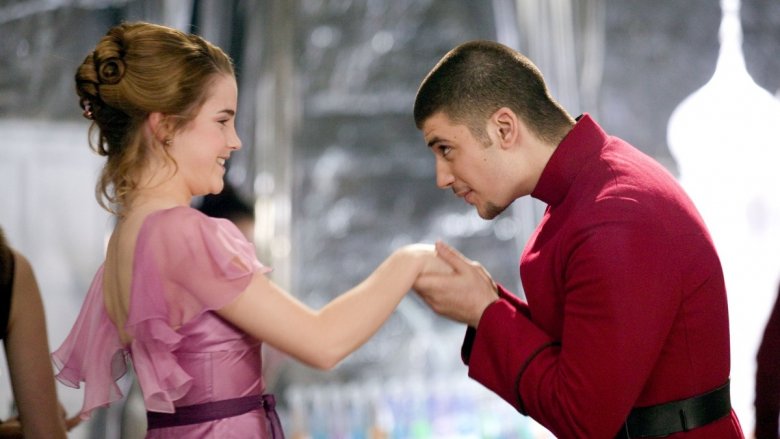Harry Potter Fan Theories That Change Everything
As detailed and well thought out as J.K. Rowling's Harry Potter series was, the magical wanderings of the Boy Wizard have still left plenty of room for interpretation, despite some serious effort on the author's part to complete the story. Her digital addendum to the series, Pottermore, has helped to clear up certain lingering questions about what went down before, during, and after Harry's tenure at Hogwarts. Meanwhile, she's also gifted fans with the book-ending stories contained in the Fantastic Beasts and Where to Find Them films and her play, Harry Potter and the Cursed Child.
Even so, fans have spent countless hours mulling over the books and film franchise and have devised some pretty spellbinding theories about the world of witchcraft and wizardry, some of which have even impressed the author herself. Let's take a look at some of the most game-changing Harry Potter postulates of them all. Whether you're a hardcore fan or just diving into the saga, these fan theories change everything.
There was a Muggle vs. Wizard war, and the Muggles won
It's perhaps one of the largest unanswered questions of the series: why do wizards have to hide their powers from Muggles, and if they are so powerful, why aren't they in charge of the world? If history has taught us anything, it's that usually those with superior firepower and knowledge win in any matchup. However, one Redditor had a different idea, and it gives an interesting alternate explanation — Wizards and Muggles fought a war sometime in the Middle Ages, and the Muggles won. At the end of Goblet of Fire, it is revealed that the Ministry of Magic has to talk to the British Prime Minister about bringing a dragon into the country. This implies that the Minister of Magic reports to the British Prime Minister and may require his approval for matters of this nature. Additionally, wizards of today appear to be much less powerful when compared to ancient wizards like Merlin, the Peverells, and the founders of Hogwarts. Perhaps the Muggles were more successful with their trials and inquisitions than we were originally led to believe.
J.K. Rowling was really writing about ... herself?
There were a lot of colorful characters to come and go in the Harry Potter series, but none felt quite as familiar as Rita Skeeter, the intrepid journalist who would stop at nothing to get her scoop for the Daily Prophet. While her ethics were often questionable, as she was known to fudge on a few details to spice up her columns from time to time, there was something about her prose that made many fans wonder whether J.K. Rowling may have designed the character to be reminiscent of herself. After all, Rowling is also a writer who also made a detailed accounting of the non-muggle world that feels very, very real to some readers.
At least one theorist has taken it a step further and suggested that Rowling actually is Rita Skeeter in real life, spilling all of these well-documented details about the wizarding world to us no-maj types as a means of getting revenge against those who shunned her from the other side. Skeeter was an unregistered animagus (that is, able to shapeshift into animals at will), so she could probably disguise herself as another human. Plus, there was that time she was captured by Hermione in her animagus beetle form and blackmailed into altering her reporting style in return for the witch's silence about her animagus status. Since Rowling has no problem using secret pseudonyms, maybe she labeled her stories as fiction, as they so often deserved to be, as a way of getting them out.
Horcruxes are made via cannibalism
One process that never fully gets explained in the Harry Potter series is how horcruxes are made. Lord Voldemort was able to make himself a bounty of these little life preservers at some point in his younger years, but he seemed to be the only one who ever had any backup souls to spare and seemed to be unable or unwilling to create any more once our heroes started destroying them, so it must've been difficult.
J.K. Rowling herself has been vague about how they're made, though she did once say that attempts would probably be deadly for most wizards because it's as complicated as splitting an atom. Based on certain peoples' reactions, we have to infer it was also a pretty gross process, which has one Redditor to surmise that cannibalism may be involved somehow. The idea is that both cannibalism and the creation of horcruxes involve stealing a life force for the absorption of another, so perhaps Voldemort simply stole people's essences to break off a piece of himself for later in their place. The theory seems to have gained some serious traction in Fantastic Beasts: The Crimes of Grindelwald, as it was revealed that prior to becoming Voldemort's pet and tag-along horcrux, Nagini was actually a shape-shifting maledictus who had a female human form before we met her in the original series. Voldemort may have killed off the piece of Nagini that was human and swapped in a piece of his own soul instead.
Harry is now immortal
When Professor Trelawney made her prophecy about the fate of Voldemort and Harry Potter, she said, "Either must die at the hand of the other, for neither can live while the other survives." Most fans focused on the second part of the prophecy, understanding it to mean that one of them must eventually kill the other. But the first part of the prophecy brings up an interesting question. If both Harry and Voldemort must die at each other's hands, and Voldemort is now dead, does that mean that Harry is now doomed to an unwanted life of immortality? What about that whole scene where Harry "dies" and then comes back to life? When Voldemort used his killing curse, he actually killed his own Horcrux, the unintentional fragment of his soul that was within Harry's mind — not Harry himself. It's an interesting idea, for sure. Immortality would add another burden to Harry's already heavy load, and he would never be able to be reunited with his dead loved ones. It also adds a second, loaded dimension to his nickname, "the boy who lived."
Mary Poppins, witch extraordinaire
How's this for a mind-blowing theory: Mary Poppins, beloved musical British nanny, was actually a Hogwarts graduate. Since the Mary Poppins stories are set well before the time of Voldemort and Harry Potter, it makes sense for her to never have been mentioned — particularly because her habit of associating with Muggles and using magic in front of them would have landed her in hot water with the Ministry. Imagine for a moment: she carries her wand in her umbrella, much like Hagrid. Her flying is aided by a levitation spell on the umbrella. She carries a carpet bag filled with huge objects, much like Hermione's beaded handbag that works through the use of an undetectable extension charm. Because she primarily only uses her magic around children, Poppins can easily explain away her use of magic. The only adults who witness her magical acts are Mary's own Uncle Albert (who is probably from the wizarding world himself) and Bert. Bert himself is likely a squib, which would explain why he performs no magic himself yet seems unsurprised by Mary's use of it, and also makes sense in the context of his employment — doing odd jobs for poor pay.
Dumbledore is Death
In the Deathly Hallows, we hear a story within a story: "The Tale of the Three Brothers," centered on the myth of the Peverell siblings. In the tale, each of the three magical brothers attempts to cheat Death of his due in various ways. Many fans have compared each of the three brothers to the story arcs of Voldemort, Snape, and Harry. Voldemort echoes the story of the eldest brother, who believes he can defeat Death with massive magical power but eventually fails because of his own hubris. Snape represents the middle brother, who is consumed by his grief over a lost love, Lily Potter. Finally, the youngest brother is a representation of Harry, who manages to hide from Death for a long time before willingly going with him and embracing his own demise. In many ways, Dumbledore can be seen as representing Death from the fable. He possessed all three Deathly Hallows at one point, gave Harry the invisibility cloak of the youngest Peverell brother, was at least partially responsible for the demise of both Voldemort and Snape, and is the character who greets Harry when he "dies" and goes to King's Cross station. While we'll probably never get an actual confirmation of the theory, Rowling herself has gone so far as to say that it is her favorite theory of all time and that "It's a beautiful theory and it fits."
The Dursleys were so awful because of Voldemort
Hold onto your butts — it's going to be a wild ride. We all know that Harry's mind became an unintentional pseudo-Horcrux when Voldemort accidentally killed himself when his Avada Kedavra curse rebounded. A small piece of Tom Riddle's soul latched onto Harry's brain and cozied up in there for the next 17 years. Even though Harry was not a "traditional" Horcrux, we know that Voldemort's presence affected Harry, giving him some of Voldemort's powers and causing occasional angry and violent outbursts. What if Harry wasn't the only one affected by Voldemort's presence?
As vividly illustrated in the books, Voldemort's true Horcruxes were capable of dramatically changing the personality of someone exposed to one for extended periods. Harry and Hermione were frequently snappish and angry while carrying the locket, and normally happy-go-lucky Ron turned into a raging, jealous mess who abandoned his friends. If a Horcrux can do that to a genial and good-natured person, what might it have done to the Dursleys, who were around Harry every day for ten years? From flashbacks, we know that Petunia wasn't exactly a very nice person as a child, and Vernon was probably no better. But it is interesting to consider that maybe their already sour natures were further exacerbated by Voldemort's evil influence. Since Dudley was born the same year as Harry, he's literally lived almost his entire life around this Horcrux. It almost makes you feel a little sorry for them ... almost.
Neville wasn't just clumsy
During Neville Longbottom's first flying lesson, he earned a reputation as clumsy and perhaps not the brightest student in the new class of first-years at Hogwarts. What if some of that reputation was undeserved? There are plenty of other examples of Neville being clumsy with magic and spells during his early years at the school, and he certainly was forgetful at times. But that first flying lesson may not have been Neville's fault at all. When Professor Trelawney first made her prophecy about the birth of the Chosen One, Neville Longbottom was one of the candidates. However, Voldemort chose to go after the Potters first, marking Harry as his equal when he tried to use the killing curse. What might the result have been if he had gone to the Longbottom home first instead? If he had, and Neville's mother had similarly sacrificed herself for her child, we might have been reading about Neville Longbottom and the Deathly Hallows instead of Harry Potter.
After Voldemort's death, the Longbottoms were targeted by Death Eaters and tortured to insanity, which speaks to a definite animus against the Longbottoms by Voldemort's crew. When Professor Quirrell first tries to kill Harry in Sorcerer's Stone, he does so by bewitching Harry's broom as he rides it during a Quidditch match. The unnatural movements of Harry's broom are very similar to what happened to Neville during his flying lesson. What if that arm-breaking incident was because Quirrell was using the same charm to exact a little torture on the Longbottom boy? Additionally, it should also be pointed out that, until it was broken during the events in Order of the Phoenix, Neville was using his father's wand — the father who was driven insane when Neville was an infant. As we all know, "the wand chooses the wizard," and so some of Neville's early difficulties with spells may have been due to him using this hand-me-down. After Neville gets a new wand, he seems to grow in leaps and bounds in his confidence and spell abilities.
Harry and his pals actually chose their own houses
The issue of Harry Potter's apparent fitness for House Slytherin was one that plagued him throughout the series, and there may have been a good reason why: he was supposed to be sorted into that house. In Harry Potter and the Sorcerer's Stone, the book makes it clear that the Sorting Hat struggled with where to put Potter, after the Boy Wizard kept thinking over and over again, "Not Slytherin." The Sorting Hat assured him that it'd be a good fit for him but sent him over to House Gryffindor instead, per his unspoken wishes.
As a result of that scene, some fans suspect that Harry may not have been the only one who moved himself to another house where he might've better belonged to on paper. One fan theory suggests that both Ron and Hermione were also sent to Gryffindor rather than houses they were suited for (Hufflepuff and Ravenclaw, respectively) because of their own preferences and the fact that they admired Gryffindor's bravery above their own inherent traits (his being loyal to a fault and hers being ultra studious). For Ron, the reasoning behind the choice seems simple enough; all of his family was already in Gryffindor, so he wanted to fit in. For Hermione, who was sorted before Harry or Ron, it may have just been a reflection of her own newfound valor in venturing into this whole new world alone.
The Centaurs knew everything from the start
There were two big scenes in the Harry Potter series which pitted the titular wizard against his arch-nemesis Voldemort in the Forbidden Forest, and the first may have foreshadowed the last. As one fan theorist points out, after his brush with death as a baby, Harry's first encounter with the Dark Lord took place in the forest, where he was sent to detention alongside Hermione, Ron, and Draco Malfoy with instructions to find out what was killing off the unicorns. There he found a cloaked figure (which he'd later discover to be Voldemort) drinking a unicorn's blood who was scared away by Firenze.
Firenze was then scolded by his fellow centaur Bane, who warned him, "we are not sworn to set ourselves against the heavens. Have we not read what is to come in the movements of the planets?" The centaurs didn't go on to spell it out, so what we didn't know at the time was that Harry's fate was to die at the hands of Voldemort in that very place, and that's exactly what would happen to him in Harry Potter and the Deathly Hallows. In other words, the centaurs pretty much foretold the final battle before Harry knew the identity of the cloaked figure that threatened his life so early on.
Saving Snape
The Defense Against the Dark Arts classroom was a revolving door for professors at Hogwarts during Harry's time as a student. First, there was a Professor Quirrell, who carried Voldemort on the back of his head; then came Gilderoy Lockhart, who was a fraud and lost all his memories due to a misfired memory charm. Remus Lupin also walked away after he was exposed as a werewolf, then Mad-Eye Moody turned out to be Barty Crouch Jr. in disguise, and Dolores Umbridge got herself dismissed for insubordination and general wickedness before Severus Snape was finally transferred from his Potions position to take over the position. All the while, Snape seemed like the most obvious choice for the role, and some fans were left to wonder why he didn't get it until Harry Potter and the Half-Blood Prince.
One theory has it that Dumbledore never gave him the post to protect him. The idea is that because he wouldn't let Tom Riddle (a.k.a. young Voldemort) have the job years before, he cursed the position and assured that everyone who occupied it would suffer some kind of cruel fate and serve just one year. Dumbledore refused Snape the job until he made the Unbreakable Vow to kill Dumbledore and thus resigned himself to a horrible year already. The theory might also explain why Snape, as Headmaster, installed death eater Amycus Carrow in the role next, as he was clearly willing to sabotage the guy on the sly whenever possible.
Professor Trelawney wasn't such a kook
She might have caught a lot of flak for her histrionics, but Professor Trelawney was actually on the mark with her prophecies a lot more often than people thought. For example, a re-read of what she predicted in Harry Potter and the Prisoner of Azkaban has some theorists believing she predicted Dumbledore's death long before it happened because she refused a seat at Christmas dinner by saying, "If I join the table, we shall be thirteen! Nothing could be more unlucky! Never forget that when thirteen dine together, the first to rise will be the first to die!" With Peter Pettigrew hiding out in the form of Ron's rat Scabbers, there were 13 people at the table, and Dumbledore was the first to stand.
Meanwhile, she might not have been so wrong in Harry Potter and the Goblet of Fire when she sensed that Harry was born in "mid-winter." Sure, Harry was a July baby, but what we didn't know at the time was that a piece of Voldemort was still embedded in him at the time, and Tom Riddle's birthday just so happened to be December 31. So some speculate her misinterpretation may have only been due to the fact that her sense was so strong that she was picking up on the Dark Lord's date of birth instead. Considering these and all the other times she was right on the money with her soothsaying, it looks like Sybill Trelawney shouldn't have been such a laughingstock after all.
Hermione's pronunciation guide was for readers, too
Harry Potter fans well know that Hermione Granger is a stickler for good diction (cue all the "leviosA" GIFs), but it wasn't just her linguistics prowess that made her give Viktor Krum a little tutorial on how to pronounce her name correctly in Harry Potter and the Goblet of Fire. See, the fourth book in the series was published in the summer of 2000, more than a year before the release of the first film adaptation, and since Hermione isn't as common a name as Harry or Ron, some readers were mispronouncing her name in their heads.
Rowling has now confirmed one Twitterer's theory that she included the passage of the character sounding out her name as "her-my-oh-nee" to Durmstrang's triwizard champion in order to clear up any misconceptions about how to say it. Like Viktor, there may have been some who sounded it out like "hermy-own" before the film allowed Emma Watson to clarify that issue in character, so Rowling slipped in a little phonetics lesson of her own amid all the other Potions and Defense Against the Dark Arts tutorials on the page.

